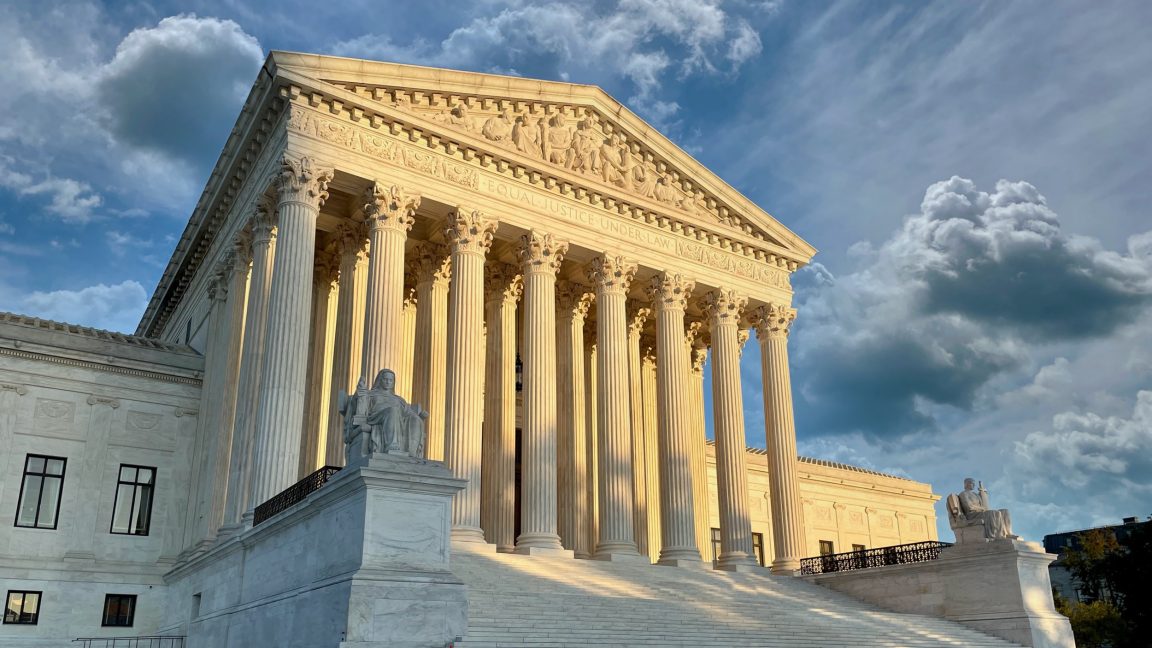The US Supreme Court will hear appeals of a 5th Circuit ruling that called Universal Service fees on phone bills an illegal tax.
The US Court of Appeals for the 5th Circuit ruled in July that the Federal Communications Commission's Universal Service Fund is unconstitutional and that the fees on phone bills are a "misbegotten tax." The FCC and several non-government groups challenged the ruling, and the Supreme Court agreed to take up the case on Friday.
The Universal Service Fund is an $8 billion-a-year system that subsidizes the expansion of telecom networks with grants to Internet service providers and makes access more affordable through programs such as Lifeline discounts. The FCC program has faced several court challenges filed by Consumers' Research, a nonprofit that fights "woke corporations," and a mobile virtual network operator called Cause Based Commerce.
The conservative 5th Circuit's ruling conflicted with decisions by the 5th and 11th Circuit appeals courts, which both rejected claims that the Universal Service Fund is unconstitutional. In a 9–7 ruling, the 5th Circuit objected to the FCC's decision to let the Universal Service Fund be administered by a private organization called the Universal Service Administrative Company (USAC). The 5th Circuit said the FCC "subdelegated the taxing power to a private corporation," and that "the combination of Congress's sweeping delegation to FCC and FCC's unauthorized subdelegation to USAC violates the Legislative Vesting Clause in Article I, § 1."
FCC Chairwoman Jessica Rosenworcel said on Friday, "I am pleased that the Supreme Court will review the 5th Circuit's misguided decision. For decades, there has been broad, bipartisan support for the Universal Service Fund and the FCC programs that help communications reach the most rural and least-connected households in the United States, as well as hospitals, schools, and libraries nationwide. I am hopeful that the Supreme Court will overturn the decision that put this vital system at risk."
FCC challenge
The FCC and Department of Justice submitted a petition for Supreme Court review, saying the court should decide "whether the combination of Congress's conferral of authority on the Commission and the Commission's delegation of administrative responsibilities to the Administrator violates the nondelegation doctrine."
The US petition said the USAC "performs administrative tasks on the FCC's behalf" but "exercises no independent regulatory power." The FCC calculates a contribution factor that determines what phone companies will have to pay, and the USAC "calculates each carrier's contribution by applying the factor to that carrier's 'contribution base' (generally, the carrier's interstate and international telecommunications revenues)," the petition said.
"The Administrator, in short, performs an advisory role; it has no independent substantive power to set the contribution factor or the amount of individual carriers' contributions," the US said. "In performing that role under the FCC's 'authority and surveillance,' the Administrator does not exercise governmental power."
The Supreme Court also received a challenge from broadband consumer advocacy groups and several lobby groups representing ISPs. The Supreme Court granted both petitions for writs of certiorari, consolidated the cases, and set one hour for oral arguments.
Case to be heard during Trump administration
The incoming Trump administration will likely have installed new leaders at the FCC and DOJ by the time oral arguments are held. Republicans and Democrats have both supported the Universal Service Fund, though incoming FCC Chairman Brendan Carr wants Big Tech companies to pay into the fund. Former Republican Chairman Ajit Pai recently said the Universal Service program should be funded through Congressional appropriations instead of fees levied on telco companies and their customers.
The Supreme Court's short order granting the petitions said that in addition "to the questions presented by the petitions, the parties are directed to brief and argue the following question: Whether this case is moot in light of the challengers' failure to seek preliminary relief before the Fifth Circuit."
The 5th Circuit ruling said, "It is not clear that Cause Based Commerce's pocketbook injury is still redressable because sovereign immunity may bar recovery of the monies it paid into USF pursuant to the Q1 2022 USF Tax. If that is right, Cause Based Commerce's challenge might be moot because no court-ordered relief could redress the injuries it incurred as a result of the Q1 2022 USF Tax."
But the 5th Circuit said it didn't have to reach that question "because even assuming Cause Based Commerce's injury is no longer redressable, it is nonetheless justiciable because it is capable of repetition yet evading review." The Q1 2022 USF Tax "evades review because it was in force for just one quarter," too short a duration to be fully litigated to the Supreme Court before it expired, the 5th Circuit said. At the same time, the claim "is capable of repetition" because "there is 'a reasonable expectation'—indeed, a near certainty—'that [Cause Based Commerce] will be subjected to the same action again.'"


